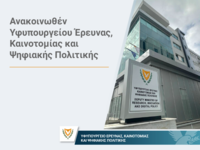Press Releases

19-05-2023 10:42
Speech by the Deputy Minister of Research, Innovation and Digital Policy, Mr Philippos Hadjizacharias at the International Educational Conference on «Digital Transition and Inclusion in Education: An Agenda for Action»
Distinguished members of the academic and scientific community,
Dear educators,
Esteemed guests,
I would like first and foremost to congratulate The Council for Education in the Commonwealth (CEC), the University of Nicosia, the Foundation for the Management of European Lifelong Learning Programs (IDEP), and UNESCO Chair of the University of Nicosia and all those who contributed in organizing today’s international educational conference aiming at exchanging views on the opportunities and challenges posed in education in the era of digital transition.
Undoubtedly, technological developments, digitization and emerging cutting-edge technologies such as AI are rapidly transforming society and the economy as a whole as well as the working environment. It is now more important than ever to strengthen human resources skills through training, including vulnerable groups of the population, to be able to use Information and Communications Technologies and digital media for work purposes and for processing their daily transactions. The labor market will face revolutionary changes as some of the traditional jobs will disappear while new ones will be created. Jobs that are usually downgraded are those involving every day and repetitive tasks that computers can perform more efficiently, for instance office work and assembly work in factories. However, AI differs from previous technological developments in that it will also bring greater structural changes to high-wage occupations. For example, some of the processes followed by professionals in medicine and law can be automated with AI.
Education will play a key role in helping society adapt to these changes. The educational system should thus be adapted in such a way that it focuses on skills that machines will be less capable of and not on those that will quickly be considered obsolete. Jobs that will grow will be those that require personal input, flexibility, problem-solving skills and creativity. At present, automation and information technology have not succeeded in replacing these skills to any great extent. The importance of developing the so-called soft skills of employees was also highlighted in research conducted on behalf of the Deputy Ministry by Ernst & Young recently. Such skills include presentation, communication and interpersonal skills.
At the same time computer learning in schools should be at a high level and students should be taught IT-related subjects such as Mathematics, Statistics and Programming. To create a truly digital society, the Deputy Ministry implements actions to upgrade the skills of the entire population, for an economy without social exclusions. In the context of the National Action Plan for Digital Skills, it is envisaged to develop the Citizens’ Digital Academy platform where citizens will have free access to educational material. A number of actions aim at reshaping school curricula, promoting science and technology careers and cultivating an entrepreneurial mindset.
As regards the development of citizens’ digital skills, the Deputy Ministry, in collaboration with bodies such as the Cyprus Academy of Public Administration, the Human Resources Development Authority, the Productivity Center, and Universities, plans and implements actions to develop and upgrade skills of both the public and private sector workforce, as well as the general population, including vulnerable groups and remote areas residents. In this context, the National Action Plan for Digital Skills 2021-2025 has been approved by the Council of Ministers, and the Deputy Ministry has proceeded to establish a Governance Group with representation from the involved public and private agencies to promote its implementation. Finally, it is noted that the specific actions have been included in the RRF and provide for an investment of more than €24 million.
Particularly as regards the public sector, under ESF funding, the Cyprus Academy for Public Administration is implementing a series of training programs on digital skills, from basic to advanced level, based on the identification of needs through a dedicated survey that took place on behalf of the Deputy Ministry. The survey resulted in more than 13000 training needs at 90 public organizations in the fields of MS Office, cybersecurity, social media, teleworking/ e-learning tools, e-collaboration and productivity tools.
For the said period, more than 3000 civil servants participated in trainings and these will be offered on a continuous basis until the end of 2023.
The training on cybersecurity at a basic level, will begin during 2023 with estimated participation of 2500 public sector employees, funded by the national RRP. In the area of advanced cybersecurity and under the national RRP, there are specific actions that will cover the training needs for more than 500 public servants in the specialized sectoral areas of health, defence and maritime.
Demand for skills in growing sectors such as IT is very high as supply lags behind the market. Difficulties in attracting and retaining qualified human resources in Cyprus contribute to the skills gap. Talented researchers and promising startups often receive attractive proposals from abroad.
The strategy should cover the full cycle of formal education, vocational training, higher education and post-doctoral level. At the same time, greater emphasis must be placed on lifelong learning to enable workers to acquire and improve IT-related skills.
As far as the general public is concerned it is noted that the Cyprus Productivity Centre is implementing various training programs under the national RRP for people over 55 years old, in the areas of Computer skills, use of smart devices, use of e-government systems & services, MS Office, digital skills for health and wellbeing, and for the general public in the areas of MS Office (basic to advanced), cybersecurity, digital marketing, e-learning and teleworking tools. Specifically, for 2022 more than 70 training programs took place with more than 800 participants, while in the period 2023-2025 more than 450 training programs are estimated to take place. Currently, the effort is to design additional courses in consultation with social partners, funded by the Deputy Ministry, targeting vulnerable groups such as people in remote areas and people with disabilities. Moreover, the Cyprus Productivity Centre has completed a survey on digital skills needs among the general public and industry, in December 2022.
The Human Resource Development Authority is also implementing training activities for digital skills. HRDA has included in RRP 2021-2026 a specific intervention for Skilling, Reskilling and Upskilling for digital skills. The Deputy Ministry has completed a dedicated survey among CITEA members on ICT roles & skills, and the results will include curricula for trainings to be launched in 2023, under the RRP.
At the same time, the Deputy Ministry implements actions aiming at facilitating the digital transformation of businesses. For the period 2021-2027, a program with a total budget of 30 million euros has been designed to support the digital transition of businesses, including the use of cutting-edge technologies such as artificial intelligence, blockchain and cloud computing services. In addition, with the operation of the Digital Innovation Hub, services will be provided to businesses to facilitate the widespread integration of digital technologies.
Ladies and gentlemen,
The opportunity to use new revolutionary technologies, such as AI in education is incredibly powerful; it has the potential to dramatically improve the way we learn and teach, which can positively impact future generations. Nevertheless, it has also ushered in a new era of Big Data, and technology brings its own challenges. Personalized learning, automation of repetitive tasks, access to information, are only a few of the opportunities offered, while ensuring quality and relevance of information, developing critical thinking skills and ethical considerations are all issues that need to be addressed before we can introduce these technologies in our educational system.
I am certain that these issues will be discussed and analyzed in depth during the Conference.
I wish you fruitful deliberations.
Thank you.
(MH)
Relevant Press Releases







